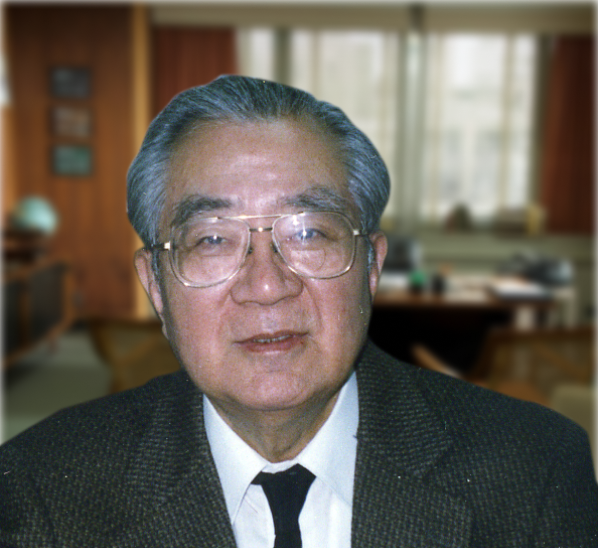- RICHARD G. WILSON and KAYSER SUNG, and their staff produce each week a journal that is setting a standard for critical but fair examination of the complex spectrum of economic affairs. With their 40-odd colleagues in Hong Kong and 20 correspondents in Asia and the West, this editorial team, since 1960, has also published a Yearbook that is proving a reliable reference source for industrialists studying markets and government planners charting investments.
- KAYSER SUNG, who joined the Review in 1959 as Deputy Editor after 12 years with Reuters, mastered his profession during the hard years in wartime China. He was appointed concurrently Publisher and Managing Editor in 1964. His passion for research as the foundation for all reporting is becoming a distinguishing mark of the journal’s staff. An authority on such subjects as the textile industry in Asia and the terms of European trade with the Far East, he also shows himself sensitive to the human dimension.
- The RMAF Board of Trustees recognizes their accuracy, impartiality and continuing search for facts and insights in recording Asia’s quest for economic advancement.
Within the past decade the Far Eastern Economic Review has become the most consequential journal of its kind in Asia. Providing detailed and increasingly dependable information on trade, finance, economic problems and progress, and related political trends, it has earned regard as valued reading among businessmen, government officials and scholars.
In most of Asia, the objective careful economic reporting and analysis that is vital to development is both a new and difficult craft. Statistics often are incomplete and occasionally unreliable. Preoccupation with politics in the era of new independence has sometimes led to ignoring the hard realities of economic life upon which material achievements must be based. Private businesses and governments are often reluctant to permit probing inquiry.
Despite these and other obstacles the editors of the Far Eastern Economic Review, RICHARD G. WILSON and KAYSER SUNG, and their staff produce each week a journal that is setting a standard for critical but fair examination of the complex spectrum of economic affairs. With their 40-odd colleagues in Hong Kong and 20 correspondents in Asia and the West, this editorial team, since 1960, has also published a Yearbook that is proving a reliable reference source for industrialists studying markets and government planners charting investments.
RICHARD G. WILSON came to the Review as editor in 1958. Trained both in law and journalism in England and the United States, he chose to apprentice on the Financial Times of London to specialize in economic journalism. Well-traveled and scholarly, his particular interests are the problems in Africa and Asia of telescoping economic and social advance into a short span of time.
KAYSER SUNG, who joined the Review in 1959 as Deputy Editor after 12 years with Reuters, mastered his profession during the hard years in wartime China. He was appointed concurrently Publisher and Managing Editor in 1964. His passion for research as the foundation for all reporting is becoming a distinguishing mark of the journal’s staff. An authority on such subjects as the textile industry in Asia and the terms of European trade with the Far East, he also shows himself sensitive to the human dimension.
In their editing of the Review, WILSON and SUNG have demonstrated that journalism can play a constructive role in fostering healthy growth. Both respected for their professional and personal integrity, these two editors are making economic news significant and readable.
In electing RICHARD GARRETT WILSON and KAYSER SUNG to receive the 1964 Ramon Magsaysay Award for Journalism and Literature, the Board of Trustees recognizes their accuracy, impartiality and continuing search for facts and insights in recording Asia’s quest for economic advancement.
I feel intensely moved and honored in accepting the 1964 Ramon Magsaysay Award for Journalism and Literature, which has been conferred on Richard Wilson and myself for our work with the Far Eastern Economic Review. I am also grateful for this chance to come to Manila and receive the Award in person. This gives me an opportunity to say something about the journalistic principles, which you have chosen to recognize.
With improving communications in the world today, with the drawing together of peoples through many types of organized meetings and through private contacts, and with the rising interest in foreign countries which is felt almost everywhere, I feel that newspapers and periodicals face a new, heavy and growing responsibility. There is certainly a keen demand for simple but intelligent explanations of the complicated problems of Asia, Africa and other hitherto underdeveloped regions; for dependable information about their domestic and foreign attitudes; for comprehensible analyses and interpretation of financial, commercial and industrial developments. Good reporting serves moreover to promote the economic growth of the developing countries and the welfare of their peoples.
In the profession of journalism I believe in writing that may be argumentative, but is nonetheless factual and balanced. This high Award has not only strengthened that belief, but has inspired me to work more vigorously to meet the requirements of the region in the journalistic field.
On the Far Eastern Economic Review we have neither striven for public recognition nor expected any such thing. You will understand, therefore, how moved we were in Hong Kong, I and every member of our staff, to read of our election for the Ramon Magsaysay Award. It was recognition more perhaps of an effort than an achievement; the honoring of a principle of journalism, which I believe, is in conformity, whatever the shortcomings of our actual performance, with the great spirit of your late, deeply lamented President.

